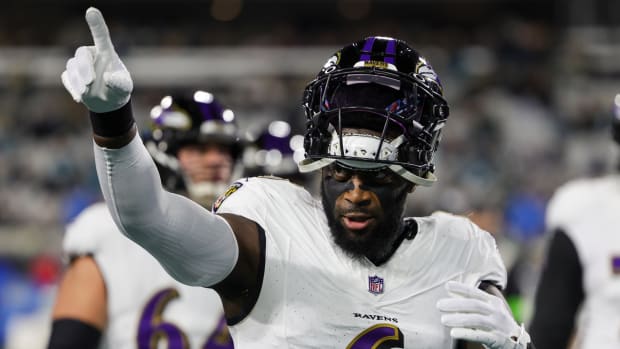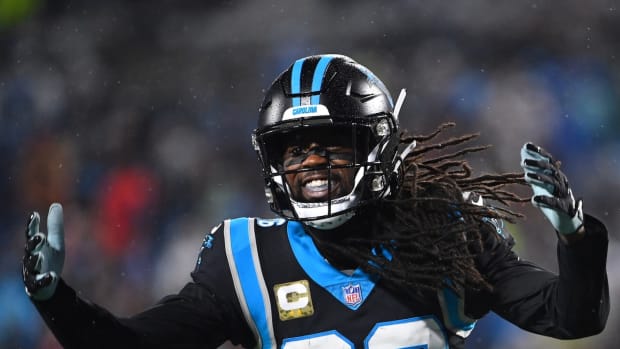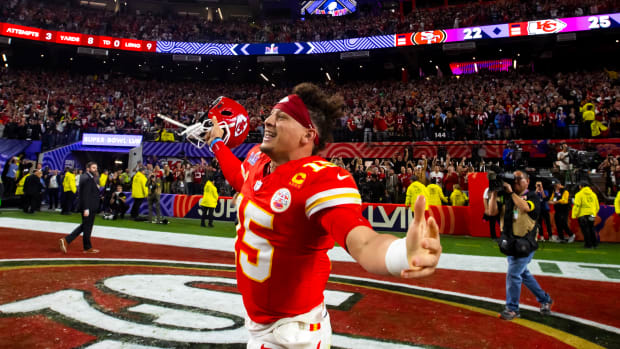Bill Belichick Will Walk Away, Someday. Let’s Appreciate What He’s Accomplished
MINNEAPOLIS — The end is coming for Bill Belichick, and maybe the last great trick of his unbelievable career is that people don’t see this. Belichick will turn 66 this spring. He is essentially doing two jobs that are more than full-time: Patriots’ head coach and general manager, though he does not officially have the latter title. He has never taken a year off. Logic says he cannot do this at this level into his 70s, and Belichick has said that himself in the past. Well, 66 is not so far from 70. You don’t need a degree from Wesleyan to do that math.
Belichick has quieted most retirement speculation in his usual way. He just ignores it. He deflected retirement questions last week by saying he is focused on the Eagles, but he has deflected so many questions that way that it hardly seemed unusual.
So let’s pause now, before Belichick’s eighth Super Bowl as a head coach—not to speculate about how long he will coach, but to appreciate how long he has lasted.
The position that Belichick holds is famous for burnout. Dick Vermeil walked away at age 46 and didn’t return for 15 years. Bill Parcells walked away at 49, and then again at 58, and finally at 65, the age Belichick is now. Don Shula was also 65 when he retired. Chuck Noll last coached at 59. Jimmy Johnson won two Super Bowls by age 50, but only coached four seasons after that. Bill Walsh only lasted 10 years with the 49ers before he walked away at age 57; he returned, briefly and unsuccessfully, to coach Stanford.
To fully appreciate what Belichick has done, consider: Walsh and Bill Parcells combined to win five Super Bowls in 29 seasons. Belichick has won five in 23 seasons.
Belichick has a few confidantes, but only a few. Even those who see him every day don’t usually know what he was thinking. Patriots offensive line coach Dante Scarnecchia has been with Belichick for almost his entire New England tenure, and they worked together as assistants. But when I asked Scarnecchia if they were friends, he said, “No. We have a professional relationship.”
Have they ever had a meal together outside the Patriots’ facility?
“Meal?” Scarnecchia said. “Lookit: Bill has people he is very comfortable with, and we all respect that. I like working for him.”
To understand how Belichick has lasted this long, look where he looks. Belichick finds assistant coaches in the most unlikely places. John Carroll University. Rensselaer Polytechnic Institute. Georgetown. His special teams coach, Joe Judge, went to Mississippi State, but his playing career was limited; he did, however, make the Dean’s List. Belichick himself is a Wesleyan grad.
The Eagles have seven coaches who played in the NFL. The Patriots have one.
One benefit of Belichick’s hiring approach: There are no former stars who got into coaching because they needed something to do, or because they wanted to stay in the game. Every one of his coaches really wanted to coach. They know, when he hires them, that they must learn before they start to teach. Belichick perennially keeps one of the smallest coaching staffs in the league, but he keeps those brains churning from before dawn until long after dusk.
“It’s amazing: You look around, and it’s 11:30, 12 o’clock at night,” Scarnecchia says. “You’re not the Lone Ranger in there, now. There’s a lot of guys in there. You come in the next day and there’s a lot of guys in there. It’s all day, every day.”
Coaching is like being a lawyer: You have to work insane hours because there is no way to split the work. Two coaches who each watch one hour of film do not equal one coach watching two hours of film. You need to watch all of it to get the most out of it.
This has always been the central appeal of coaching for Belichick. He was not just drawn by blocking sleds and fiery speeches. Every game is a new puzzle to solve. Every film session teaches him something new. Even rule changes are not just something to digest before returning to coaching. They are part of the puzzle.
This feels like a weird thing to say on Super Bowl Sunday, but a big part of succeeding in sports is not getting bored. We don’t think about sports that way—we think of touchdowns and parades and big paychecks. But success comes largely from performing monotonous tasks and not finding them monotonous. Belichick likes that the puzzle keeps changing. On the day I talked to Scarnecchia, he said the staff would go watch two hours of practice film afterward, and he knew Belichick would be the same attentive, brilliant coach he always is.
“Does he look any different to you?” Scarnecchia asked this week. “Does he sound any different? He’s the same old guy, man. Set your watch. That’s what he is.”
Truth: Belichick does look different, and he definitely sounds different. The change seemed to start in 2015. That was the year when the Patriots won their fourth Super Bowl and Deflategate dominated the news. On the same day that September, SI and ESPN both published long stories about why the rest of the league did not trust the Patriots—and the extent of the mistrust.
Maybe Belichick realized that, fair or not, a lot of people might remember him for his –gates instead of all he accomplished. You can see why that might bother him. He is not just the game’s premier coach; he is probably its premier historian. Belichick has sounded more appreciative, his tone less militaristic. The “Do Your Job” ethos does not infect every public word he utters. He does not seem so fidgety and uncomfortable. He arrived here in Minnesota looking like he wanted to enjoy every last minute, because he knows the very last minute is coming—if not tonight, then relatively soon.
Dante Scarnecchia got out once. He retired after the 2013 season, when he was 64 years old and the owner of three Super Bowl rings. He was not tired of coaching. He always loved coaching. He was tired of the all-consuming nature of it, the double-and triple-shifts, one after another.
Coaches often have withdrawal when they get out; it’s hard to go from 90 hours a week to nothing. Scarnecchia did not have withdrawal. He built furniture in the shop of his house in Narragansett, R.I. He played golf. He surfed and paddle-boarded and played with his grandkids, and he says, “It was a great life. I didn’t look back. I was happier than a pig in mud, man.”
He was in California, speaking to coaches at the University of Pacific, when Belichick asked him to come back. Belichick had fired Dave DeGuglielmo and wanted Scarnecchia to take his old job. Scarnecchia wasn’t interested. But around 10 days later, he met with Belichick and decided to come back. He says he needed a couple weeks for the rust to come off—for his body and brain to acclimate to the coaching life again. Now he is almost 70 and taking it year to year.
I asked if Belichick ever seems tired of the grind. It would have been easy for Scarnecchia to say “definitely not”’—to squelch any speculation. But Scarnecchia is 70, taking it year to year, and he just said the truth:
“I don’t have that kind of relationship where he will come up to me: I’m really tired today. I don’t think he’ll ever tell me that.”
It is easy to wonder: What the heck would Bill Belichick do without football? He has more responsibilities than anybody other team employee in the NFL. But maybe he will be happier than we think. Maybe his mind will find other ways to churn.
In the meantime, let’s appreciate what he has accomplished. Scarnecchia sure does.
“I never thought we would be able to be part of nine Super Bowls,” Scarnecchia says, counting the one he and Belichick coached in as Patriots assistants. “You just don’t even think that. I don’t think that way. I’m not a person that is a negative person, but: Nine Super Bowls?”
It is incredible, but more incredible: Belichick has made it to 11 Super Bowls. This is his eighth as head coach. He coached in two as an assistant with the Giants, and one as an assistant with the Patriots. If this is his last Super Bowl, or even if this is his last game, let’s appreciate the mental stamina he showed all these years. Other coaches have had Hall of Fame careers. What is amazing about Bill Belichick is that he had two.
Question or comment? Email us at talkback@themmqb.com.





































